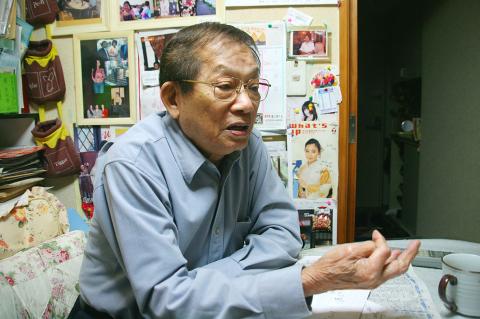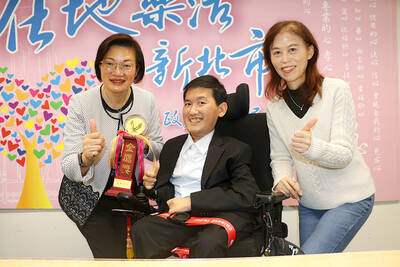The story of what happened to former Japanese solider Shigerumastu Takeei after he served in the military during World War II and was jailed for five years in Papua New Guinea as a prisoner of war (POW) may sound difficult to believe, but it is 100 percent true.
“Japanese people respect the emperor, but so what? He owes me money!” Takeei told the Taipei Times in an exclusive interview in his apartment in Tokyo last month.
His real name is Chien Mao-sung (簡茂松). He is Taiwanese, born in what is now Tucheng City (土城), in 1925, when Taiwan was a Japanese colony.

Photo: Loa Iok-sin, Taipei Times
At the age of 15, Chien adopted his Japanese name at the encouragement of the colonial government. When he turned 17, he voluntarily joined the military as a non-combatant.
“Of course I condemn Japanese imperialism, and right now, I would definitely say the education we received was brainwashing, but at the time, we truly believed in what we were taught,” Chien said. “When in high school, my classmates and I admired Japanese soldiers and we always said we wanted to take part in the war as non-combatants.”
Though it recruited Taiwanese to serve in the military during World War II, Japan initially used them as non-combatants. Only toward the end of the war were they drafted for combat duty.
In 1942, Chien was sent to Borneo to serve as a guard at POW camps, but was transferred to a combat unit in June 1945 as Japan’s situation became desperate.
At a POW camp in Kuching, Borneo, Chien said that he got along well with most Allied POWs and locals.
“The Japanese soldiers treated the POWs cruelly; they slapped them, or ordered us to beat them or slap them, just because POWs made small mistakes or upset them,” he said. “But since those POWs from Allied forces weren’t enemies for us Taiwanese, most guards from Taiwan were very nice to them and they also became friendlier with us over time.”
Many Taiwanese guards turned a blind eye when POWs took breaks during forced labor, he said. Others would even pass cigarettes or extra food to POWs. From time to time, Chien would even go out to fish with locals to bring extra food for POWs.
There was one time, though, when Chien slapped a British POW who had passed him without saluting, as POWs were required to do.
“I decided to let it go, since I didn’t think it was a bad thing to let them have some dignity,” Chien said. “But a Japanese officer saw it and stopped both of us.”
The officer shouted at Chien for letting the POW not salute him and ordered him to slap the British officer.
“I hesitated and the officer threatened to penalize me for disobeying his order, so I decided just to slightly touch the POW’s face. The Japanese officer wasn’t satisfied and ordered me to hit hard,” he said, adding that he had no other choice but to follow the order.
“To this date, I still remember the anger and humiliation in the British officer’s eyes,” Chien said.
Soon after Japan’s surrender in August 1945, Chien and other members of the Japanese military were arrested by Australians and was then transferred to Labuan, where a military trial took place.
“Soon after we got on the boat, the Australian soldiers turned off the light and started beating us,” Chien said.
Chien and others were sent for what was in his view an unfair trial. The court was a tent on the beach. The prisoners were brought into the tent and listened to the accusations, Chien said.
“They [the judges] decided what they wanted to do with you only in a few minutes — five years, 10 years, 20 years, or death,” he said.
Chien said he didn’t think he would get any penalty because he treated the POWs well. In the end, he received a five-year prison term for slapping the British POW.
“What made me really angry was that many Japanese officers who ordered us [Taiwanese guards] to beat or slap POWs escaped by saying they didn’t tell us to do it. [They claimed] we did it on our own because Taiwanese are cruel and barbaric,” Chien said.
After enduring five years in the POW camp, Chien “returned” to Japan in March 1951.
“I asked if I could go back to Taiwan, but camp officials said I was jailed as a Japanese soldier, so I had to go to Japan,” Chien said.
Before being freed, a Japanese general told Chien he would be treated as a hero for his sacrifice for the “homeland” and be given compensation.
Chien soon realized after landing near Hiroshima that things would not be so favorable.
“The former Japanese POWs were greeted warmly by immigration officers and given rice and money,” Chien said. “But when another Taiwanese POW and I got off the boat, we were greeted only by a cold look and the question: ‘You are no longer Japanese, why don’t you go back to Taiwan?’ and given a temporary residency certificate for foreigners.”
“I was shocked and angered,” Chien said.
Chien received another unpleasant surprise when he learned he was not entitled to any compensation for his time as a POW because his employment with the Imperial Japanese Army was terminated in 1946.
“I was penalized by Japan, which I considered my homeland and trusted at the time for the sacrifices I made for it,” Chien said.
To this day, Chien as well as dozens of former soldiers from Taiwan, have yet to receive a positive response from Japan’s government.
Even for those who became naturalized Japanese, their demand for compensation was turned down by courts based on the argument that there was no law concerning compensation for veterans of former colonies, Chien said.
“They are all my friends, some are very close friends,” Chien said, showing pictures of him with members of the Japanese Diet. “They know very well what the issue is, they sympathize with me, but they wouldn’t do anything for fear of public opinion.”
“I’m old, I don’t know how much longer I can fight for it but I hope the younger generation could carry on the mission, or at least know the history,” he said.

A strong continental cold air mass is to bring pollutants to Taiwan from tomorrow, the Ministry of Environment said today, as it issued an “orange” air quality alert for most of the country. All of Taiwan except for Hualien and Taitung counties is to be under an “orange” air quality alert tomorrow, indicating air quality that is unhealthy for sensitive groups. In China, areas from Shandong to Shanghai have been enveloped in haze since Saturday, the ministry said in a news release. Yesterday, hourly concentrations of PM2.5 in these areas ranged from 65 to 160 micrograms per cubic meter (mg/m³), and pollutants were

Taiwan’s armed forces have established response protocols for a wide range of sudden contingencies, including the “Wan Chun Plan” to protect the head of state, the Ministry of Defense (MND) said today. After US President Donald Trump on Saturday launched a series of airstrikes in Venezuela and kidnapped Venezuelan President Nicolas Maduro, concerns have been raised as to whether China would launch a similar “decapitation strike” on Taiwan. The armed forces regularly coordinate with relevant agencies and practice drills to ensure preparedness for a wide range of scenarios, Vice Minister of National Defense Hsu Szu-chien (徐斯儉) told reporters before a

EVA Airways on Saturday said that it had suspended a pilot and opened an investigation after he allegedly lost his temper and punched the first officer several times as their plane was taxiing before takeoff at Los Angeles International Airport. According to a report published on Thursday by The Reporter, the incident occurred after the flight’s Malaysian first officer tried to warn the Taiwanese pilot, surnamed Wen (文), that he was taxiing faster than the speed limit of 30 knots (55.6kph). After alerting the pilot several times without response, the first officer manually applied the brakes in accordance with standard operating

The New Taipei City Social Welfare Department on Thursday celebrated Paralympic competitor Chen Tzu-wei (張孜維), who received last year’s national Golden Eagle award for exemplary achievement by Taiwanese with disabilities. Chen, who suffers from childhood-onset muscular dystrophy, did not attend the first award ceremony held by the Ministry of Health and Welfare in November due to illness. Chen was formally presented with the award at the department, where he gave thanks to government workers for supporting his education and livelihood, the department said in a statement. Chen was raised by the Ai-hsin Home for Persons with Disabilities in the city’s Bali District (八里)